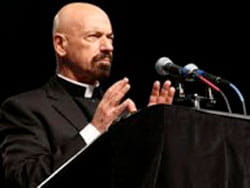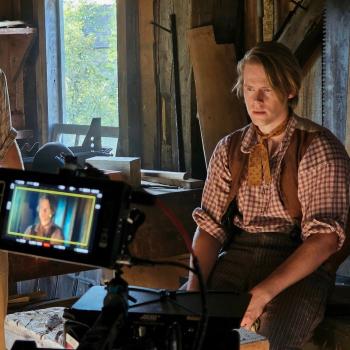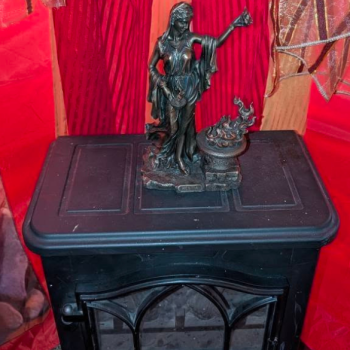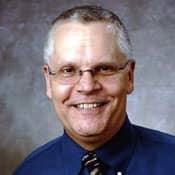 |
| Photo courtesy of Patrick Novecosky |
Of all the bizarre comments contained in John Corapi's rambling speech on Monday, there was one that struck me as especially strange, and particularly sad.
Near the beginning, when he makes clear that he's not actually leaving the priesthood, but only suspending his public work as a priest (and dropping the title "Father"), he shrugs off the impact this will have on his life. Nothing much will change, he says, explaining that he really had little to do with the sacraments, anyway—saying mass, hearing confession, anointing the sick.
"I didn't do very much of that quite honestly in the twenty years that I did minister," he says, adding, "90 percent of what I did in the past did not require ordination. Speaking through social communication—radio, TV, so forth—that's not ministry, strictly speaking. My particular mission was speaking, writing, and teaching—not so much in the sacraments, but outside of them, in conjunction with them. So what I'm going to be doing in the future is pretty much the same thing."
Well. I have to appreciate his candor. But off the top of my head, I can't think of any priest I know who has so effectively and completely marginalized—even minimized—the most transcendent aspect of his priesthood: celebrating the sacraments. Any one who has been given the great gift of Holy Orders knows that ordination is not strictly about what we do, but about what we are, and what we become. And yet, a priest becomes, by sacred ordination, alter Christus, another Christ. Fundamental to that is grace—the grace to reconcile the penitent, anoint the sick, baptize new Catholics and, most humbling and overwhelming of all, transform bread and wine into the body and blood of Christ in the sacrifice of the mass.
To John Corapi, it seems, that really didn't matter so much. It didn't seem to matter much to his superiors, either, who allowed him to live apart—a Black Sheepdog or a Lone Wolf.
At a time when parishes are starving for priests, and some men are spending hours every Sunday on the road, shuttling from parish to parish to celebrate mass and hear confessions, John Corapi, like Bartleby the Scrivener, shrugged and said, "I prefer not to."
And that, evidently, was fine. He had other things to do. He traveled, he spoke, he recorded, he wrote books. He strode across stadium stages to thunderous applause and cried out for repentance and faithfulness, and told again and again of his astonishing journey from rags to riches to rags to redemption. He confronted medical crises, and fought legal battles, and emerged even stronger. And that was fine, too. He had something to say, and thousands, if not millions, who wanted to hear it. He was an ardent and impassioned defender of the faith.
But I can't escape the feeling that something was missing, and that Corapi himself was missing something.
Talk to any priest you know. Ask him: "What's the best part about being a priest? What do you love about it?"
I did that the other day, after the Corapi news broke. I talked to a handful of priests. Again and again, I got the same answers: "Saying mass." "Hearing confession." "Offering the sacraments."
Hearing that, and thinking of John Corapi, I thought of other priests, in other circumstances.
I thought of Fr. Henri Perrin, who wrote so movingly of secretly celebrating mass on Palm Sunday in 1944 in a German concentration camp:
When I held the sacrifice between my fingers, I was holding up to God in complete faith the lives of all the men sleeping round me."
I thought of the priests of Dachau, who were forbidden to say mass, but did so anyway, risking their lives. According to one account:
During the time that the Polish priests were not allowed to say Mass, they asked the priest from Block 26, who was in charge of the chapel, to give them hosts and wine so they could celebrate Mass in secret. The Polish priests who worked on the plantation (farm) at Dachau would kneel on the ground and pretend to be weeding. They had a small portable altar which one of the priests would press into the ground. The priests would kneel down and receive Communion from their own hands.





